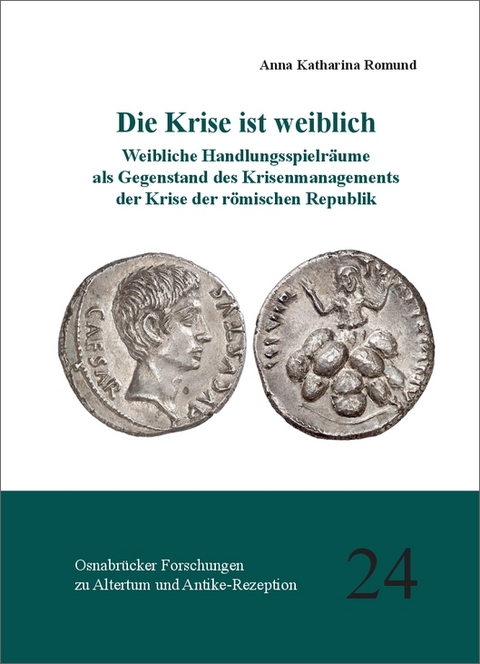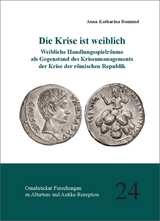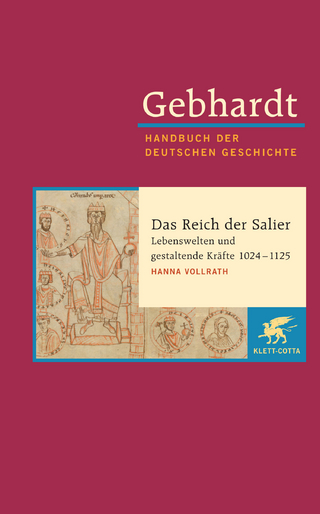Die Krise ist weiblich
Weibliche Handlungsspielräume als Gegenstand des Krisenmanagements der Krise der römischen Republik
Seiten
2023
|
1., Aufl.
VML Vlg Marie Leidorf (Verlag)
978-3-89646-745-4 (ISBN)
VML Vlg Marie Leidorf (Verlag)
978-3-89646-745-4 (ISBN)
In der althistorischen Geschlechterforschung herrscht die Ansicht vor, dass sich die politischen Handlungsspielräume von Frauen in der Krise der römischen Republik im 1. Jh. v.Chr. massiv ausgedehnt hätten. Nur vereinzelt wurden Überlegungen angestellt, inwiefern dieses Krisenphänomen im Zuge von Krisenmanagement revidiert werden sollte. Um diese Frage beantworten zu können, wird die These der wachsenden Handlungsspielräume neu aufgerollt. Mit einem konsequent diskursanalytischen Ansatz wird die communis opinio widerlegt und der Umgang der althistorischen Forschung mit ihren Quellen grundlegend in Frage gestellt. Bis zum Ende der Republik ist keine kontinuierliche Ausdehnung der politischen Handlungsmacht von Frauen bzw. keine grundsätzliche Kritik daran erkennbar ist. Erst die augusteische Ehegesetzgebung entfesselte den Diskurs. In den Narrativen der Republik markieren die Frauenfiguren zunächst nur das Versagen des Krisenmanagements während der Bürgerkriege als Genderproblem. Nach der Krise wird an den exempla das Verhalten beider Geschlechter verhandelt. Für Frauen wird die Äußerung öffentlicher Trauer moniert. Als Ausdruck von Kritik am Bürgerkrieg bewertet, wurde sie zum Ansatzpunkt von Maßnahmen des princeps. Damit aber waren nicht signifikant vergrößerte politische Handlungsspielräume von Frauen, sondern ihre traditionellen Aufgaben im Fokus des Krisenbeendigungsstrategie des princeps. Die Untersuchung erweist das Versagen des Krisenmanagements in der späten Republik gemäß der zeitgenössischen Wahrnehmung als Genderproblem und bringt einen neuen Aspekt des Krisenmanagements des Augustus als Emotionenmanagement hervor. Die Ergebnisse unterstreichen den Wert von Geschlecht als Analysekategorie auch für die Erforschung der politischen Geschichte Roms.
The dominant view in gender research in the discipline of Ancient History is that the political spheres of influence of women increased enormously during the crisis of the Roman Republic in the first century BC. It has only rarely been considered in how far this crisis phenomenon was to be revised as part of crisis management. In order to address this question, the present volume reconsiders the idea of increasing spheres of influence. Through the consistent application of discourse analysis, the communis opinio is falsified and the way Ancient History deals with its sources is questioned at a general level. Until the end of the Republic, neither a continuous increase in the political influence spheres of women nor a fundamental criticism thereof can be recognised. This discourse was only begun with the Augustan marriage laws. In the narratives of the Republic, female actors at first only highlight the failure of crisis management during the civil wars as a gender problem. After the crisis, the behaviours of both genders are negotiated with reference to the exempla. Women’s public expression of grief is condemned – as it was interpreted as an expression of criticism of the civil war, it became the starting point of measures taken by the princeps. However, this means that the focal point of the princeps’ crisis management strategy was not a significant increase of political influence for women, but rather their traditional roles. In accordance with contemporary perceptions, the present study casts the failure of late Republican crisis management as a gender problem and adds the management of emotions as a new aspect of Augustus’ crisis management. These results underscore the importance of gender as an analytical category also for understanding the political history of Rome. The dominant view in gender research in the discipline of Ancient History is that the political spheres of influence of women increased enormously during the crisis of the Roman Republic in the first century BC. It has only rarely been considered in how far this crisis phenomenon was to be revised as part of crisis management. In order to address this question, the present volume reconsiders the idea of increasing spheres of influence. Through the consistent application of discourse analysis, the communis opinio is falsified and the way Ancient History deals with its sources is questioned at a general level. Until the end of the Republic, neither a continuous increase in the political influence spheres of women nor a fundamental criticism thereof can be recognised. This discourse was only begun with the Augustan marriage laws. In the narratives of the Republic, female actors at first only highlight the failure of crisis management during the civil wars as a gender problem. After the crisis, the behaviours of both genders are negotiated with reference to the exempla. Women’s public expression of grief is condemned – as it was interpreted as an expression of criticism of the civil war, it became the starting point of measures taken by the princeps. However, this means that the focal point of the princeps’ crisis management strategy was not a significant increase of political influence for women, but rather their traditional roles. In accordance with contemporary perceptions, the present study casts the failure of late Republican crisis management as a gender problem and adds the management of emotions as a new aspect of Augustus’ crisis management. These results underscore the importance of gender as an analytical category also for understanding the political history of Rome.
The dominant view in gender research in the discipline of Ancient History is that the political spheres of influence of women increased enormously during the crisis of the Roman Republic in the first century BC. It has only rarely been considered in how far this crisis phenomenon was to be revised as part of crisis management. In order to address this question, the present volume reconsiders the idea of increasing spheres of influence. Through the consistent application of discourse analysis, the communis opinio is falsified and the way Ancient History deals with its sources is questioned at a general level. Until the end of the Republic, neither a continuous increase in the political influence spheres of women nor a fundamental criticism thereof can be recognised. This discourse was only begun with the Augustan marriage laws. In the narratives of the Republic, female actors at first only highlight the failure of crisis management during the civil wars as a gender problem. After the crisis, the behaviours of both genders are negotiated with reference to the exempla. Women’s public expression of grief is condemned – as it was interpreted as an expression of criticism of the civil war, it became the starting point of measures taken by the princeps. However, this means that the focal point of the princeps’ crisis management strategy was not a significant increase of political influence for women, but rather their traditional roles. In accordance with contemporary perceptions, the present study casts the failure of late Republican crisis management as a gender problem and adds the management of emotions as a new aspect of Augustus’ crisis management. These results underscore the importance of gender as an analytical category also for understanding the political history of Rome. The dominant view in gender research in the discipline of Ancient History is that the political spheres of influence of women increased enormously during the crisis of the Roman Republic in the first century BC. It has only rarely been considered in how far this crisis phenomenon was to be revised as part of crisis management. In order to address this question, the present volume reconsiders the idea of increasing spheres of influence. Through the consistent application of discourse analysis, the communis opinio is falsified and the way Ancient History deals with its sources is questioned at a general level. Until the end of the Republic, neither a continuous increase in the political influence spheres of women nor a fundamental criticism thereof can be recognised. This discourse was only begun with the Augustan marriage laws. In the narratives of the Republic, female actors at first only highlight the failure of crisis management during the civil wars as a gender problem. After the crisis, the behaviours of both genders are negotiated with reference to the exempla. Women’s public expression of grief is condemned – as it was interpreted as an expression of criticism of the civil war, it became the starting point of measures taken by the princeps. However, this means that the focal point of the princeps’ crisis management strategy was not a significant increase of political influence for women, but rather their traditional roles. In accordance with contemporary perceptions, the present study casts the failure of late Republican crisis management as a gender problem and adds the management of emotions as a new aspect of Augustus’ crisis management. These results underscore the importance of gender as an analytical category also for understanding the political history of Rome.
| Erscheinungsdatum | 13.09.2023 |
|---|---|
| Reihe/Serie | Osnabrücker Forschungen zu Altertum und Antike-Rezeption ; 24 |
| Verlagsort | Rahden/Westf. |
| Sprache | deutsch |
| Maße | 165 x 240 mm |
| Gewicht | 1630 g |
| Einbandart | gebunden |
| Themenwelt | Geschichte ► Allgemeine Geschichte ► Altertum / Antike |
| Schlagworte | Augustus • EmotionenManagement • Frau • Handlungsspielraum • Krisenmanagement • Römerin • Trauer |
| ISBN-10 | 3-89646-745-X / 389646745X |
| ISBN-13 | 978-3-89646-745-4 / 9783896467454 |
| Zustand | Neuware |
| Haben Sie eine Frage zum Produkt? |
Mehr entdecken
aus dem Bereich
aus dem Bereich
die Inszenierung der Politik in der römischen Republik
Buch | Hardcover (2023)
C.H.Beck (Verlag)
48,00 €
Buch | Hardcover (2024)
Klett-Cotta (Verlag)
50,00 €




